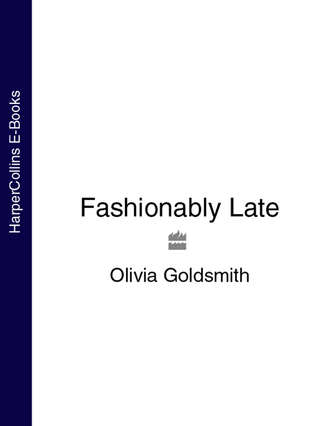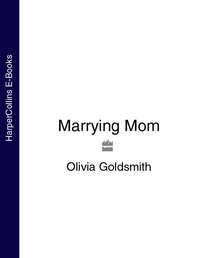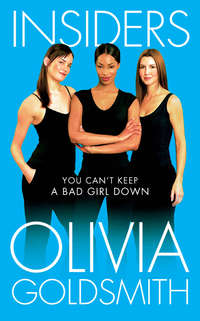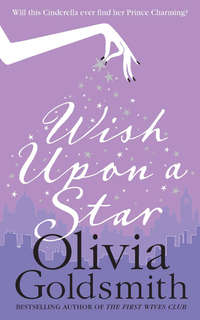
Полная версия
Fashionably Late
As if she was reading Karen’s mind, Lisa looked up and smiled. ‘I can’t tell you how thrilled Stephanie is about her intern job.’ Stephie – who wasn’t doing well in high school – had opted for a study program. She was to work part-time at Karen’s.
‘Isn’t it dangerous, her going into the city like that alone every day?’ Belle asked. Still rooted in Long Island, Lisa and her family lived in Inwood.
‘Oh, Ma. She’s almost seventeen. She’ll be a senior in high school next year. All the kids in her class have jobs. But they’re stuck at Burger Kings and J.C. Penney’s. I think she can negotiate the four blocks from Penn Station to Karen’s showroom.’
‘Oh, don’t tell me. A schvartzer could grab her at any minute.’
‘Mother! Not “schvartzer.” “Black.” You can’t call black people “schvartzers” anymore.’
‘Why not?’ asked Belle. ‘It means the same thing.’
Karen shook her head. How had Arnold put up with Belle for all those years? Karen knew there was no sense talking to her mother. She may as well talk to her own ovaries. Nothing would change. And technically Belle was right, schvartzer did mean ‘black’ in Yiddish, but the connotation was all wrong and completely different. Belle was an expert in the letter-of-the-law arguments: as a kid, Karen nearly had apoplexy trying to get Belle to admit to hypocrisy or unfairness in her positions. Belle couldn’t or wouldn’t acknowledge them. She spoke, for instance, about how the family had left Brooklyn because of ‘the element.’ Belle would have been shocked and disgusted by anyone who said ‘nigger,’ but wasn’t her code just an epithet by another name? Belle never specified exactly what ‘the element’ was, just that ‘the element’ had changed. When Karen had studied high school chemistry and gotten to the periodic table, she had asked her mother which of the elements on it they had been escaping from. Belle hadn’t seen the humor. Humor was never Belle’s strong suit.
Karen looked over at the woman and suddenly wondered if her real mother was so … so Belle-ish. It wasn’t that Karen didn’t love and appreciate Belle. She was grateful. After all, Belle had taken her in and cared for her and educated her and taught her so many things. Despite Belle’s prejudices and her third-person disembodiment, Belle was a careful, involved mother. Sometimes too involved. Karen felt guilty for being critical of Belle in any way. But wasn’t that the unnatural inheritance of an adopted child: we couldn’t afford to reject a mother when we had already been rejected by one.
Now Belle picked up the salad plates and compulsively wiped up a minuscule spot of salad dressing beside Karen’s place. It was a silent rebuke. Then Belle went out to the kitchen for the next equally small course.
Lisa looked across the table at Karen and shrugged. They understood that there was no changing Belle. Lisa lowered her voice. ‘Are you all right?’ she asked. Karen shook her head. ‘What?’ Lisa’s face tightened with concern. ‘The doctor?’
‘Not now,’ Karen told her, and jerked her chin toward Belle in the kitchen. ‘Talk about something else.’
Lisa nodded and raised her voice to a normal level. ‘I really mean it about the job for Stephanie. She needs something like this and I won’t lie. The money will come in handy.’
Lisa was always short of money. It confused Karen. Leonard had to be doing very well, but somehow it seemed that Lisa was always in some sort of trouble with her Bendel’s account or her Bloomingdale’s card or her other bills. Still, she kept on spending. Karen knew that long ago Lisa had begun smuggling in any new clothing purchases and hiding them around the house. She’d told Karen that since she had no money of her own, she had to beg Leonard for cash. Karen almost visibly shuddered when she thought of living like that, but Lisa seemed to prefer to have too little money and too much time on her hands than to go out and get a job. Since closing her little boutique – more a hobby than a business – she had not worked. The idea of working seemed to fill her with horror. Karen had to smile. My sister Lisa: a Jewish, female, Maynard G. Krebbs.
Belle returned with the inevitable plates of desiccated chicken. Beside the flat, white breast there was some punished broccoli. Belle believed that nothing should be cooked al dente except perhaps her Jell-O, which was frighteningly chewable. To this day Karen didn’t know her mother’s secret for creating that leathery skin on a gelatin cup.
‘I’m looking forward to spending more time with Stephanie,’ Karen said aloud. Actually, she had some reservations about hiring her niece as an intern. And Jeffrey was furious about it. ‘The girls in the showroom are competitive and jealous already,’ he had said to her. ‘We don’t need this.’ He was probably right, but Jeffrey had never really liked Lisa or Leonard. He considered them both too provincial and too materialistic, and he thought their kids were spoiled. ‘Plus, it certainly won’t help Tiffany’s self-image,’ he had added as an afterthought, referring to Lisa’s other daughter. Karen had to agree with that.
‘How’s Tiff?’ Karen asked now. Tiffany was Lisa’s younger daughter, her fat one. Built kind of like Karen, the girl was already at thirteen almost as tall as her sister, Stephanie, and had to be double Stephanie’s weight. There was no doubt that Tiff was bright, and she did well academically, but there was no denying she was troubled. Except, of course, by Belle, who insisted Tiff’s weight was simply a question of lack of willpower and spite.
‘She’s fine,’ Lisa said, but her voice tightened.
‘She’s fat is what she is,’ Belle said, and stabbed at the dried-out piece of chicken on her plate. ‘Fat and cranky.’
For a moment, Karen felt dizzy – almost as if she might faint. She’d heard this, just this and just like this, before. This is déjà vu, she thought. Or perhaps it had actually happened. Then it came to her. She had sat there so many evenings when she herself had been a teenager and Belle had called her fat and cranky in exactly that same dismissive tone of voice.
When Lisa had been no more than a toddler and Karen had started the rocky preteen years, she and Belle had begun to disagree for the first time. Most kids had fights over clothes with their parents but with Belle and Karen fights took on epic proportions. Arnold, predictably, refused to participate. A labor lawyer and negotiator, he refused to negotiate at home. His abstention meant, for all intents and purposes, that Belle had the field all to herself. The battles were all about appearances and control. Belle had threatened, cajoled, ridiculed and then gone back to threatening, all to get Karen to ‘dress properly,’ to diet. And to give up the idea of Pratt and go for one of the Seven Sisters colleges. But, along with some of her baby fat and her status as an only child, in her teen years Karen had lost her eagerness to please. She was a rock, and when she started wearing thrift shop looks, Belle went ballistic. Remembering it now, Karen shook her head. There had been so much animosity over what had only amounted to a normal passing phase.
Mrs Watson had saved Karen. A WASP, one of the few left in the suburban town, Ann Watson had lived in the only old house on the street – a white-pillar Georgian that was as disheveled as its owner – a bird-like older woman who drank most of her days away. Once the land the Lipskys’ house sat on had been part of the Watson estate. Now Mrs Watson’s lawn was weedy and smaller in size than the other plots, sold off one by one. But Mrs Watson had taught Karen to play bridge, taught her about couture, about why the tatty Aubusson rugs on her floors were better than Belle’s spotless wall-to-wall, and she had given Karen her cast-off Chanel jackets (the skirts were too small), which Karen had worn with work shirts and jeans. Mrs Watson had approved. ‘You,’ she’d said, squinting at Karen over the top of her daiquiri glass, ‘you have a gift. Natural style.’ Mrs Watson had been a refuge.
And Mrs Watson had given Karen a major gift: a window to view her own future. Mrs Watson told Karen about Coco Chanel, and Karen – not a great reader – went to the library and read everything she could about the design great. Gabrielle Chanel became Karen’s idol, her avatar. All the paper doll drawings, all the looking at clothes and fabrics came together and made sense. Mrs Watson was the compass who showed Karen her true direction. Karen saw that there was a job she could do, a thing she could be that she wanted.
Of course, Belle had never approved of Mrs Watson. ‘Alte goyem,’ she’d said. Whenever the woman’s name was mentioned, Belle made the same face, one of distaste, that she was making now about Tiffany.
‘Fat and cranky,’ Belle repeated. Both of her daughters ignored her.
‘So when do you leave for Paris?’ Lisa asked. She, too, wanted the focus of the conversation to change.
‘Not until the end of the month, and not then if things continue this way. I can’t seem to pull the line together this season. Wouldn’t you know this is the year we pick to do our first show in Paris. Home of Coco Chanel and Worth, and I’m going to show them some farshlugginer wrap dress.’ Karen thought of the Oakley Award night – less than twenty-four hours before, back in the Mesozoic period – and sighed. What had happened to her enthusiasm? Her confidence? Had it drained out somewhere in Dr Goldman’s office? ‘A designer is only as good as her latest line,’ she said.
‘Oh, you say that every season,’ Lisa tut-tutted.
‘Maybe you’re not ready,’ Belle opined.
Karen shook her head and wondered how it could be that both her sister’s unquestioning faith in her and her mother’s lack of same offended. I must be unreasonable in my expectations, she told herself. And today has certainly not been a good day. But it seemed as if, after all this time, Lisa still expected Karen to be able to do anything effortlessly and Belle still assumed Karen was the toddler lost in the lilac bushes. Karen sighed. Well, she reminded herself, you’re not the only one from a dysfunctional family. Ask John Bradshaw.
She thought again for a moment about her real mother and wondered if at this very moment the woman was harping at her own daughter, the one she had not given away to strangers. Karen remembered – or thought she did – cuddling up to a neck she’d once held and the smell of powder on her real mother’s skin. She remembered a green toy frog. Maybe, just maybe, she remembered the yellow and white alternating bars of a crib, and her hand extended through them to the big warm hand of her real mother. Had that really happened? What is she doing now, Karen wondered, and then forced herself to look up and join the conversation.
‘I wish I could go to Paris,’ Lisa was saying. ‘We haven’t been since our honeymoon. But Leonard says that with this bat mitzvah expense there’s no way we’re taking a vacation this year.’ Karen wondered if she was supposed to chime in with an invitation to France, but before she had a chance to think about it further …
‘You’re spending too much on this, anyway. What do you need buses for?’
‘Buses?’ Karen asked.
‘To take people from the synagogue to the affair,’ Lisa explained.
Belle tsked and moved them back to Tiffany. ‘What is she wearing for the ceremony?’ she was asking. ‘Not that green taffeta, I hope.’
‘Mother, she likes it.’
‘She looks terrible in it, and she’ll have those pictures the rest of her life. She’ll resent you for not telling her. Her children will ask her how her mother let her wear that dress.’
‘It’s a Ralph Lauren.’
‘Yes, and it’s designed for a little Christmas shiksa. Who can wear plaid, especially a green and red taffeta plaid?’ Belle turned to Karen. ‘Am I right?’
‘I haven’t seen the dress,’ Karen said, and heard Arnold’s old tone of neutrality in her own voice. Like Switzerland and Arnold, Karen didn’t want to be dragged into a World War.
‘Come and look at what I’m going to wear,’ Belle said, and she and Lisa immediately stood up. There was never a regret about leaving Belle’s table. Slowly, Karen followed the two women as they trooped down the hall, through the master bedroom, to that holy of holies, Belle’s closet. Since Brooklyn, it had grown and was now an entire guest room that adjoined the master suite. In it were custom-made shelves for each pair of Belle’s shoes, all of which were kept immaculately on shoe trees and wrapped in clear plastic shoe bags. There were custom-made drawers: wide flat ones that held Belle’s scarves and narrower, deep ones for her sweaters. She had one wall sectioned off into cubicles, each of which held a purse and matching gloves. There was even a shelf across the top of one wall that had hat stands attached at the base, so that Belle’s few remaining hats were displayed, although each was only marginally visible, swathed in polyethylene film.
This closet had once been Karen’s bedroom. Lisa’s old room held Belle’s coats and jackets. Belle had not yet sprung for a moving rack, like they had at the dry-cleaners, but Karen knew her mother had been thinking about it. The most amazing thing to Karen was that Belle still knew every item in the closet, when she had last worn it, where, and with whom. No wonder she had quit teaching school so long ago. Belle’s closet was a full-time job.
Karen remembered reading that in later life Coco Chanel had moved into the Ritz Hotel but that she kept all but a few of her clothes across the street in an apartment at 31 Rue Cambon. But Coco’s life had been the creation of those clothes – she had no daughters, no husband, no family. Yet Belle’s clothes filled all the space left when Karen and Lisa moved out. Sometimes Karen wondered if Belle eventually would fill the whole house with her wardrobe and buy the old Watson place to live in.
‘Hallo. Hallo.’ Arnold’s yodel came down the hallway, followed by Arnold himself. Karen’s adoptive father was a big man – more than six two – but he slumped so much that it was hard to know just how tall he was. He wore suits that must have been unrumpled at one time but not in the last decade. Even Belle, with her compulsive neatness, couldn’t keep Arnold looking tidy. Now he came in, his battered briefcase under one arm, two wrinkled newspapers under the other. ‘I should have known you’d be in here,’ Arnold said and smiled. He looked tired. When he bent down to kiss Karen, she saw the darkness under his eyes.
He was a good man. When she was young, in her grammar school years, Karen would sometimes go with Arnold on the weekends to his office. He would take time out on those days to explain about the rights of workers and the power of unions. She still remembered the poem he had mounted on the back of his office door. It was by Margaret Widdemer, written back in 1915, around the time of the Triangle fire. Karen couldn’t remember all of it, but two lines were still clear: I have shut my little sister in from life and light/(For a rose, for a ribbon, for a wreath across my hair). Long ago, Karen had seen the irony in the fact that Arnold had spent his life trying to protect garment workers, while Belle kept shopping for a deal that had to be based on their exploitation.
‘You’re home?’ Belle asked, unnecessarily. ‘There’s chicken,’ she added as an afterthought.
‘I ate,’ Arnold told her. ‘Hi, honey,’ he said to Lisa, who had popped her head out of the closet to peck his cheek. Karen noticed that he didn’t kiss Belle and Belle didn’t make a move toward him. She was, after all, immersed in her Closetworld.
‘I have work,’ Arnold said, turning his back on them.
‘What else is new?’ Belle murmured.
For a moment Karen wondered if the three of them – women together – had bewildered him and driven Arnold away, or whether he had simply learned to fill up the empty spaces. He was a nice man. She watched as his stooped and rumpled back departed down the hallway, then Belle spoke up.
‘Now she’s going to show you something,’ Belle said, and both of her daughters knew that she was referring to herself. Lisa looked on attentively, but Karen sighed and backed out to the bedroom and sat down on the loveseat. There, on the lower shelf of the coffee table, as always, sat the leather-bound photograph album from the early days in Brooklyn. Belle wasn’t proud of it and rarely took it out. Karen noticed it as if for the first time.
‘So, what do you think?’ Belle asked, and held up a David Hayes-like dress and jacket ensemble. Very Queen Elizabeth. Belle was nothing if not predictable. ‘Look at this,’ she said and showed them the jacket lining, a turquoise-on-black reversal of the black-on-turquoise pattern of the dress. Karen nodded, bored, but Lisa actually cooed encouragement.
‘It’s great.’
Belle ducked her head back into the closet. In the moment they had alone, Lisa looked at Karen. ‘Call me tonight at home. Tell me what’s up.’ Mutely, Karen nodded.
‘And what do you think she has found to go with it?’ Belle asked, and Karen watched the two of them disappear into the closet again. In their absence, quick as a snake, Karen pulled out the old brown photo album and set it on her knees. She flipped it open to the first page, where four aging photographs showed Belle and Arnold on their wedding day. Karen had perused it all before, so she turned now to the manila envelope glued to the front inside cover. In it were loose pictures that Belle had never mounted but had also not been able to throw away. Karen heard her mother and sister exclaiming over something. In just a moment they would be expecting her to join in.
She put her hand into the envelope and pulled out a handful of black and white photos. Quickly, she fanned them out on her lap. There were two she was looking for. The first she found immediately: a picture of herself as a baby, two or perhaps a little younger. Belle must have gotten the photos from Karen’s real mother. In one Karen was lying on her back in a crib and beside her was a rubber frog. The frog she remembered. Despite the black and white photograph, she knew it was dark green, the color of lilac leaves, except for the belly, which was chartreuse, and the tongue, which was a bright, cherry red. She remembered that frog.
It took her longer to find the other photo. She was perhaps a little older in it, dressed in a snowsuit and standing in front of a doorway. It was a black and white photo, but Karen knew the snowsuit was royal blue. How old was she then? You could clearly see the brickwork of the wall and she was only six courses of brick high. On the door – a plain, black-painted, wooden one – were the numbers 2881. Karen grabbed the two photos, stuffed the rest of them back in the envelope, and had just managed to slip the album into its usual place when Belle and Lisa came out, her mother brandishing a turquoise suede clutch bag as if it were the Holy Grail.
‘Look what she found!’ Belle caroled, referring to herself and the bag.
Karen tapped the photos, safely tucked in her pocket. ‘Look what she found!’ Belle repeated, and Karen nodded, wondering what she, herself had found.
CHAPTER FOUR
The Cutting Edge
The Lincoln Town Car pulled up to her West End Avenue apartment. Karen had called ahead from her mother’s to have the car meet her at the LIRR station. She jumped out before the driver could run around and open the door for her. It was funny: Jeffrey insisted on a limo and never would open the door himself but Karen was equally insistent on the service sending nothing more than a black sedan. And she never let the drivers help her out. Arnold’s influence? Maybe that was the difference between growing up with inherited wealth and growing up middle class: inherited wealth didn’t mind letting other people do the work for them. Karen knew her biggest problem was what an expensive business consultant had called ‘her failure to delegate.’ But she just couldn’t help it. She did the job better or faster or both if she did it herself, and at least that way she was certain it would get done. So why the hell should she be imprisoned in the goddamn Lincoln while Joey or Tim or Mohammad ran around to her door?
She stepped under the British racing green canopy of the co-op that she and Jeffrey lived in and, as always, got to the door before George the doorman opened it. Maybe, she reflected, it wasn’t her failure to delegate but it was other people’s incompetence that created her problems.
‘Good evening, Mrs Kahn!’ George called out cheerfully, turning from the magazine she knew he had secreted in the credenza drawer, though he was strictly forbidden to read while on lobby duty.
The West Side had gentrified over the last decade, but plenty of homeless and the occasional junkie still wandered the streets. In New York City the doormen were required to be vigilant. She should report him for the clandestine magazine but she wouldn’t. ‘Hello, George,’ Karen sighed and hit the elevator button just before he scuttled across the black and white marble tiled floor to it. She put her hand in her raincoat pocket and felt the crackle of the two old photos that were nestled there. They comforted her, a sort of psychological hand-warmer. The elevator door drew open and she stepped into the mahogany box while George pressed the seventh floor button for her with his white-gloved finger. ‘Thank you, George,’ she sighed and, mercifully, the elevator door rolled shut.
Karen had lived in the building since she and Jeffrey were first married. It was a huge step up from the Amsterdam Avenue walk-up she’d rented before. The down payment on the co-op had been the wedding gift of Jeffrey’s parents, who had disapproved of Karen, the apartment, the neighborhood, and – most of all – the West Side address. ‘What’s so wrong with Fifth Avenue?’ Jeffrey’s mother, Sylvia, had asked. ‘Or Park? We saw a lovely little three-bedroom that was reasonable. And you’ll need the space once you start a family.’ But Karen had insisted on this West End Avenue apartment and Jeffrey had supported her. But then, Jeffrey had always liked the role of iconoclast.
It was more of a loft or atelier than a regular apartment, and Karen had loved it for its inconveniences as much as for its spectacular space. Who needed an eat-in kitchen? She never cooked. She had hundreds, maybe thousands, of books in the apartment but not a single cookbook. Instead, she had a loose-leaf binder with a take-out menu from every restaurant in New York City that delivered. They were arranged by country – Thai, Chinese, Mexican, etc. The apartment’s tiny kitchen was just fine. A phone was the only kitchen appliance she needed.
She adored the place the first moment she’d seen it and still did. Sort of like her feelings for Jeffrey. Karen might be accused of making snap judgments, but no one could say she wasn’t loyal. Now that they could afford something much more expensive, she regularly fought with Jeffrey, insisting on staying here. It was her haven.
She stepped out of the elevator into the tiny private foyer they shared only with old Mrs Katz in the north-facing apartment. Karen put her key in the lock of 7S and opened the door. Before her was a thirty-foot expanse of parquet floor and a row of seven windows, each one tall enough to be a door. In fact, two of them in the center were French doors that, when opened, let out to a tiny Juliet balcony that looked down onto the tops of the ginko trees seven floors below. The doors were shuttered on the outside. She’d had them painted Charleston green – eight parts black and one part green, simultaneously chic and practical in dirty New York City. Window boxes of trailing white geraniums and ivy gave the place a park-like touch. On bright days sunlight poured through the windows and across the floor in a wonderful chiaroscuro.
The room was also graced with a soaring ceiling and served as both a living room and library. The north wall behind her was lined, floor to ceiling, with glass-fronted bookcases that were filled almost to overflowing. Two paintings – an early one of Jeffrey’s and one by their friend Perry Silverman – hung on the white walls. Karen adored the Silverman for its wonderful depth of color. Other than that, the furnishings were spare indeed. There was a Donghia sofa that Karen’s colleague Angelo had done for her back in the days when they were both young, struggling designers, before there were things like AIDS and infertility to worry about. The sofa was upholstered in a simple white linen but had a sinuous curve across its back that was almost female.






